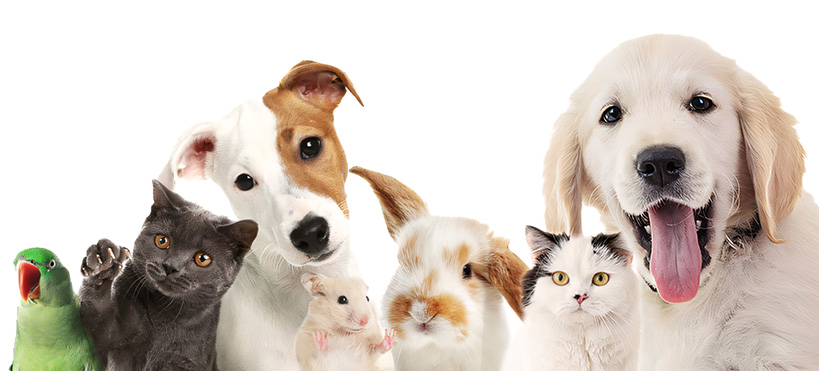
Dentistry


Why is dental care necessary?
It is estimated that 85% of all pets have periodontal disease by the time they are 3 years old. Although tooth decay is less common in pets than people, regular dental care is important to prevent bad breath, gingivitis, tooth infection and other secondary health issues caused by bacterial infections that originate from the mouth. Even if they don’t show obvious signs of discomfort, periodontal disease might be causing pain for your pets.
The primary cause of periodontal disease is plaque, the same transparent slime that forms on human teeth. Bacteria combine with food particles and saliva to form this plaque on the teeth. The bacteria can work its way under the gums, causing gingivitis (inflammation of the gums) and destroying the supporting tissue around the tooth. Apart from leading to toothaches, tooth loss, and general pain and discomfort, the bacteria can also travel through the bloodstream to infect the heart, kidneys and lungs.
Plaque is often confused with the golden-brown stains that accumulate at the base of teeth. Those stains, known as tartar, may be unsightly, but they aren’t the primary cause of periodontal disease.
Professional scaling & polishing
After your pet’s mouth is examined, tooth scaling will be performed using both hand and ultrasonic scalers, to remove plaque and tartar above and below the gum line. The plaque below the gum line is the most significant cause of periodontal disease, so it is important that it be thoroughly removed.
After scaling, the teeth are polished to remove microscopic scratches and decrease the rate of subsequent plaque build-up.
A professional veterinary dental cleaning is usually done under general anaesthesia, and is the best way to remove plaque and tartar from your pet’s teeth—especially below the gum line— and monitor their overall dental health.
How do I know if my pet needs dental cleaning?
Regular inspection of your pet’s mouth is important to detect dental disease at early stages. Signs of dental disease include:
- Bad breath
- Red and swollen gums
- Tartar buildup
- Bleeding along gum line
- Excessive drooling
- Pawing at mouth
- Difficulty picking up food and eating
Can my pet's dental cleaning be done without anesthesia?
Without general anaesthesia, it is not possible to ensure that plaque is completely and safely removed from your pet’s mouth, as we need to thoroughly clean below the gum line and behind the teeth.
Anaesthesia-free dentistry might sound appealing because it avoids putting a pet under general anaesthesia. However, this procedure can often be a higher-stress experience for our pets. Scaling the teeth involves placing sharp, vibrating, and often noisy instruments inside the mouth, and most pets are unable to comprehend the need to stay perfectly still during the procedure. Therefore, they have to be physically restrained for a lengthy period of time in order to allow the scaling to happen.
Depending on the pet’s size and temperament, they may need to be highly restrained, and this can be extremely stressful. If they move or struggle during the dental procedure, they may be injured by the dental instruments, and the teeth in the deeper sections of the mouth may not be able to be thoroughly cleaned.
Even if your pet’s teeth look pearly white and clean, plaque —the main culprit and perpetuating cause of dental disease— cannot be removed from below the gum lines without professional cleaning.
Dental treatments for pets should ideally be performed by trained veterinary professionals, to prevent injury, infection, tooth fractures, and tooth loss.
Dental X-rays
Dental X-rays allow the areas of the teeth below the gum line that are not visible from physical examination to be examined. 60% of the tooth lies beneath the gum line. Unlike humans, pets must be under general anaesthesia for dental X-rays.
Pets with severe dental disease may not even show obvious signs of oral discomfort due to their high pain tolerance. Dental radiography is the only way veterinarians can diagnose diseases affecting the tooth, root, bone and adjacent structures (nasal sinus, nerves, blood vessels, teeth). Once the problem areas are identified, the veterinarian can accurately and safely treat any dental issues, thereby relieving any discomfort.
Dental extractions
There are many possible reasons why a pet might need a tooth extracted, periodontal disease being the most common.
Periodontal disease occurs when bacteria infects and weakens the ligaments that connect teeth to the jawbone. Once this connection is weakened, the infection develops pockets between the tooth and bone, eventually loosening the tooth until it falls out.
What’s the main cause of this disease? None other than plaque, the same bacterial film that can be found in human mouths. Plaque is not to be confused with tartar, the yellow-brown buildup that often forms at the base of your dog’s teeth. Plaque, rather than tartar, is the primary cause of gum diseases.Other reasons for extraction include:
- Fractured teeth
- Deciduous teeth: Baby teeth should be removed to make room for healthy permanent teeth if they don't fall out by themselves.
- Oral trauma: If the jaw is fractured during a traumatic accident, teeth may have to be removed to make way for repairs to happen.
- Oral tumours: Removal of tumours may involve extraction of nearby teeth.
Dental abnormalities: Extra or malformed teeth which may cause problems eating or pain while chewing.